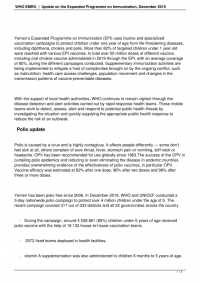Update on the Expanded Programme on Immunization, December 2019
Yemen’s Expanded Programme on Immunization (EPI) uses routine and specialized vaccination campaigns to protect children under one year of age from life-threatening diseases, including diphtheria, cholera and polio. More than 82% of targeted children under 1 year old were reached with various EPI vaccines. In total over 50 million doses of different vaccine, including oral cholera vaccine administered in 2019 through the EPI, with an average coverage of 80%, during the different campaigns conducted. Supplementary immunization activities are being implemented to mitigate a host of complexities brought on by the ongoing conflict, such as malnutrition, health care access challenges, population movement and changes in the transmission patterns of vaccine-preventable diseases.
With the support of local health authorities, WHO continues to remain vigilant through the disease detection and alert activities carried out by rapid response health teams. These mobile teams work to detect, assess, alert and respond to potential public health threats by investigating the situation and quickly supplying the appropriate public health response to reduce the risk of an outbreak.
Polio update
Polio is caused by a virus and is highly contagious. It affects people differently — some don’t feel sick at all, others complain of sore throat, fever, stomach pain or vomiting, stiff neck or headache. OPV has been recommended for use globally since 1963.The success of the OPV in curtailing polio epidemics and reducing or even eliminating the disease in endemic countries provides overwhelming evidence of the effectiveness of polio vaccines, in particular OPV. Vaccine efficacy was estimated at 82% after one dose, 96% after two doses and 98% after three or more doses.
Yemen has been polio free since 2006. In December 2019, WHO and UNICEF conducted a 3-day nationwide polio campaign to protect over 4 million children under the age of 5. The recent campaign covered 317 out of 333 districts and all 22 governorates across the country.
- During the campaign, around 4 538 861 (85%) children under-5 years of age received polio vaccine with the help of 18 133 house-to-house vaccination teams.
- 2572 fixed teams deployed in health facilities.
- vitamin A supplementation was also administered to children 6 months to 5 years of age.
- These teams were supervised by 4667 close supervisors (one close supervisors for 3–5 mobile teams, 630 district supervisors (2 per district).
- 132 governorate supervisors (6 per governorate).
- 680 supervisors from local authorities (2 per district and 2 per governorate).
- In addition to these 41 independent supervisors were deployed by WHO in various high-risk areas to support the district/governorate in training and implementation of campaign.
An independent post-campaign assessment was carried out and the preliminary results indicate an overall coverage of 91% with the lowest coverage in Say’oun (68%), Mokala (78%), Aden (79%) and Sana’a city (84%).
Preliminary results for national polio campaign, December 2019
Outreach activities update
During December 2019, an integrated outreach round that was the fourth for the year, was conducted in the selected districts/ governorates to vaccinate the target children in the remote areas. A minimum package of “routine essential health and nutrition services provided to the target children and family planning/reproductive health services to women of childbearing age.
The services provided include:
- vaccinations: against 11 childhood vaccine preventable diseases
- Integrated Management of Child Illnesses; treatment of pneumonia, diarrhoea and malaria
- reproductive health; ante/postnatal care and family planning
- nutrition; screening for malnutrition, deworming, micronutrient supplementation referral services in case required.
https://reliefweb.int/report/yemen/update-expanded-programme-immunization-december-2019

